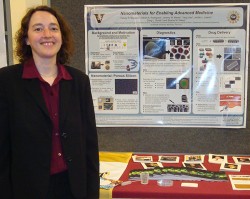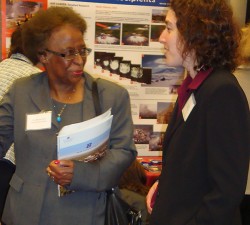Following an early morning flight to Washington, D.C., on May 7, Associate Professor of Electrical Engineering and Physics Sharon Weiss braved the rainy weather to head to Capitol Hill and meet with staff members in the offices of Sen. Lamar Alexander, Sen. Bob Corker, Rep. Jim Cooper and Rep. Chuck Fleischmann as well as the Democratic staff on the House Committee on Science, Space, and Technology’s Subcommittee on Research.
The occassion was the Coalition for National Science Funding’s (CNSF) advocacy day and Capitol Hill reception.

During these meetings, Weiss explained why maintaining robust funding for the NSF is so important and the immediate impacts that across-the-board spending cuts are having at Vanderbilt. Specifically, Weiss described how these cuts are limiting the number of graduate students that can be supported through federal grants and how this has the potential to limit the number of individuals with expertise in the STEM fields.
Weiss knows firsthand that federal funding is critical at the beginning of a researcher’s career. Her own career was jumpstarted in 2008 with the prestigious NSF Faculty Early Career Development (CAREER) Program Award. She also expressed concerns about how cuts in federal investments in science and engineering research could ultimately impact our nation’s economic competitiveness.
Following these congressional meetings, Weiss participated in CNSF’s exhibition and reception titled “Investments in STEM Research and Education: Fueling American Innovation,” which featured more than 40 projects funded by the NSF. Weiss’ exhibit focused on her NSF-funded research intended to lower limits for early disease detection using compact, low-cost drugs and her research on ways to increase drug loading capacity with controlled release of drugs in selected locations of the body.

Sharon Weiss, right, speaking with NSF Acting Director Cora Marrett at the Capitol Hill reception. (Vanderbilt Federal Relations)
Weiss spoke with NSF’s Acting Director, Cora Marrett, other NSF officials and congressional staff from both the House and Senate.
Weiss’s visit was coordinated by Vanderbilt’s Office of Federal Relations, which assists faculty like Weiss bolster the university’s ongoing advocacy efforts to protect and sustain federal science and engineering research budgets.
“Perhaps now more than ever, when budgets are tight and federal policymakers are questioning how every taxpayer dollar is spent, it is critical that Vanderbilt’s voice is heard,” said Margie Glick, assistant director of federal relations. “To ensure research like that conducted in Weiss’ lab can continue, Vanderbilt University will continue advocating for a strong federal investment in science and engineering, research and education.”